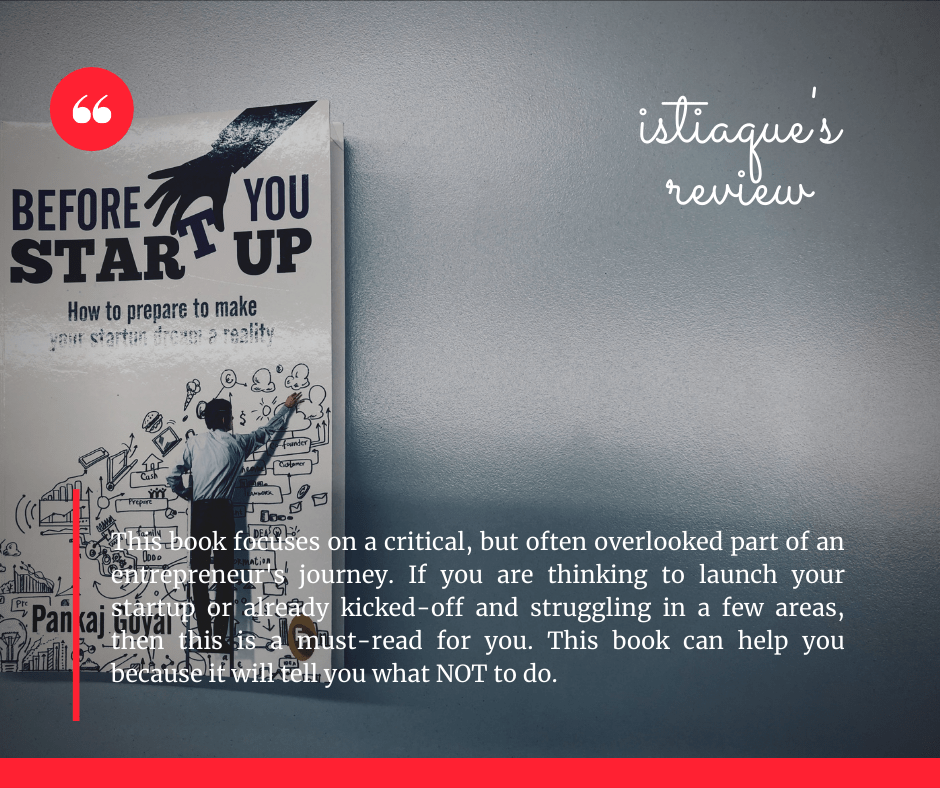I’m sure you guys have heard this sentence at least once in your life (might be in last 4-5 years) from your close contacts that “Bhaia, I’m bored with my job. I’m capable of so much more! I also want to launch a startup!”
In the last five years, I’ve worked directly with a number of startup founders in Bangladesh. Those startups are doing excellent in the market now, and a few are struggling, honestly. I have seen the founders life, experienced the ups and downs of startups, and understood a few aspects of the journey of building a company from an excel sheet to 200cr venture. The startup is no more a fascination to me, nor even a short cut way to succeed. Instead, it’s a marathon.
This book focuses on a critical, but often overlooked part of an entrepreneur’s journey. If you are thinking to launch your startup or already kicked-off and struggling in a few areas, then this is a must-read for you. Pankaj Goyal, the writer of this book demonstrated all of his experiences with thoughts, myths, fantasy and reality. He failed to run his business, and I believe, failure teaches us far more than success does. This book can help you because it will tell you what NOT to do
Chapter-1: So, you want to be an entrepreneur? Think again.
Let’s face reality first. Entrepreneurship is hard. The chances that you will fail is high. Startups fail due to multiple business reasons: not having the right product, a weak team, negative bank balance, competition and the legal system. On top of this, you face a high personal risk. Your bank balance might run out, your lifestyle will suffer, your career might take a hit, and you might face social ridicule. There is no rational reason to be an entrepreneur. It is a struggle. Be ready for it.
Chapter-2: Understand your “WHY“.
People’s biggest mistake as an entrepreneur is they don’t know why they wanted to start up! A startup is like a marathon- long and painful- where the state of mind matters. As a startup founder, you need a strong “Why”, a strong reason to keep going and find the bigger purpose for your venture. I hate my boss, or I want to have an adventure … these weak whys do not last!
Chapter-3: How to generate business ideas?
You probably have a misconception of what a business idea is. What is a business idea? In simple words, it is the solution to a problem. When you think of a business idea, you have to think of a problem and the solution. There are two steps to choose a business idea.
A. Generating new ideas
B. Evaluating them to determine the best proceed with
Most successful ideas come from years of deep experince and careful observation.
Chapter-4: How to evaluate a business idea?
Ask yourself the following questions;
A. Can you identify and profitably serve 100 customers?
· Can you define the customer problem? Is it real?
· How is your solution better than the competition?
· Are your target customers willing to pay? At what price? Is it profitable?
B. Can you find the cash to start?
C. Can you sustainably acquire customers?
D. Can you execute? Can you transform the idea into a business?
· Do you have the skills to execute?
· Do you commit to implementing?
· Do you have the resources you can access for support?
E. Does the idea fit with your “WHY”?
Try to evaluate one of your many ideas, based on the above; and see how it goes.
Chapter-5: Choosing your co-founder.
Your biggest life decision is who you marry. Your biggest startup decision is who your co-founder is. It is the heart and soul of the company. If the founding team is not strong, the startup is doomed to be a failure. Your best friend or spouse might not be the best choice as a co-founder.
In a co-founder, consider: Does this person have a skill set which you don’t have? Can you work with this person in a professional set up? Are this person’s motivations aligned with you, and do you guys share the same vision for the company? And, finally, can you trust this person?
It’s mandatory to sign a “Founder Prenup” which lays out clear roles, equity split, vesting, exit clause, and intervention mechanism. But, if you don’t find a co-founder, don’t wait too long. It is your dream; it is your journey. Get started, and people will join you.
Chapter-6: The final leg.
Entrepreneurship can be tough on your personal life. To prepare and minimise the risk, you should consider:
A. Set a timeframe on whom you will say “I quit” if things don’t work out as expected.
B. Setup milestones to track your progress.
C. Steel your mind to prepare yourself for the worst-case scenario for your business, career and lifestyle.
D. Enlist the support of family and close friends.
E. Get your finance.
F. Upgrade your skills to be ready for the startup.
H. Find a mentor to get guidance and a “sounding board.”
Chapter-7: Cut the cord!
A recap of previous chapters.
EndNote.
After you start, there are five priorities for the five twelve months—time, product, team, cash, and self.
A. Time: Don’t slack off- A startup is not a sabbatical. Prepare a plan. Follow a schedule. Plan your next day the previous night. Set tight deadlines. Follow the 80-20 rule mercilessly. Be disciplined. Learn to delegate. Measure progress.
B. Team: Keep it in your mind during hiring; what skills to hire for, quality vs speed, skills vs attitude, part-time vs full-time. To increase the chances of retaining you may follow;
· design challenging roles
· understand what motivates each individual on your team
· create a good company culture
C. Product/Service: A MVP is a product which you can show to your customers and ask for money. Once you create your MVP, keep the following in mind; do not lose focus on sales, be prepared to pivot.
D. Cash: Learn basic accounting if you are running a company. Draw a minimum survival salary. Be frugal. Collect cash early. Avoid buying things, in general. Get creative to find a cheaper alternative. Spend where it matters. Most importantly, negotiate hard. Don’t leave cash on the table.
E. Self: It is essential to be good care of yourself. You can’t afford to lose you. So, learn to be lonely, expect the unexpected, don’t be afraid to make hard decisions, stay connected with friends and family, maintain and build your professional network, build your personal brand- share your experience on social media, take care of your health.
In conclusion, remember, the more you prepare, the more you know. The more you know, the less surprised you are. The less surprised you are, the better equipped you will be. The more equipped you are, the lower the risk you will face.
All the best!






